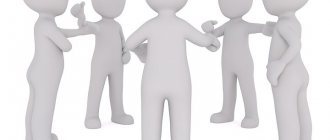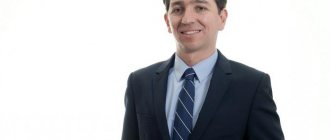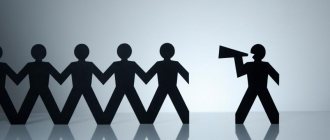Conventional personality type
Systematic, conscientious and practical people who love to structure work, systematize information, and organize processes. They prefer to work according to instructions, think in stereotypes, and follow traditions. Conservatives can realize themselves in such professions as accountant, secretary, economist.
There are many other theories about personality types in the world where you can learn a lot more about yourself. If you want to delve even further into this topic, check out the free online course “Personality Typology.”
Content
- 1 Realistic type
- 2 Social type
- 3 Artistic type
- 4 Conventional type
- 5 Enterprising type
- 6 Intelligent type
American psychologist J. Holland proposed a classification of personality types based on which areas of professional activity a person is most likely to achieve the greatest success due to certain personal characteristics. In total, they were identified with six personality types:
- realistic
- artistic
- intellectual
- conventional
- enterprising
- social.
In real life, people who could be classified strictly as a certain type are extremely rare. Most often, a person has traits of two or even three types. Then they talk about the predominant type or several types. J. Holland's questionnaire allows a person to determine the predominant personality type, and therefore, understand which areas of activity are more effective for him.
QUESTIONNAIRE, INSTRUCTIONS
We assume that after appropriate training you can do any job. From the pairs of professions proposed below, you need to choose one that suits you best (based on your abilities and capabilities). Next to the name of the profession there is a code in parentheses. In the answer form, opposite the code of the chosen profession, write a “+” sign. Then count the number of pluses in each line.
- Engineer (1) — Sociologist (2)
- Pastry Chef (1) - Cleric (3)
- Cook (1) - Statistician (4)
- Photographer (T) – Administrator of the trading floor (5)
- Mechanic (1) – Designer (6)
- Philosopher (2) – Doctor (3)
- Ecologist (2) – Accountant (4)
- Programmer (2) – Lawyer (5)
- Dog handler (2) – Fiction translator (6)
- Insurance Agent (3) – Archivist (4)
- Coach (3) - TV reporter (5)
- Investigator (3) – Art critic (6)
- Notary (4) – Broker (5)
- Computer operator (4) - Fashion model (b)
- Photojournalist (5) – Restorer (S)
- Landscaper (1) – Research Biologist (2)
- Auto transport driver (1) – Flight attendant (3)
- Metrologist (1) – Cartographer (4)
- Radio installer (1) – Wood painting artist (6)
- Geologist (2) — Interpreter-guide (3)
- Journalist (5) — Director (6)
- Bibliographer (2) – Auditor (4)
- Pharmacist (2) – Legal Advisor (3)
- Geneticist (2) – Architect (6)
- Seller (3) — Postal operator (4)
- Social worker (3) – Entrepreneur (5)
- University teacher (3) – Musician-performer (6)
- Economist (4) — Manager (5)
- Proofreader (4) — Conductor (6)
- Customs inspector (5) – Fashion designer (6)
- Telephone Operator (1) – Ornithologist (2)
- Agronomist (1) – Topographer (4)
- Forester (1) – Director (5)
- Repair and tailoring master (1} – Choreographer (6)
- Historian (2) - Traffic Inspector (4)
- Anthropologist (2) — Tour guide (3)
- Virologist (2) — Actor (6)
- Waiter (3) – Merchandiser (5)
- Chief Accountant (4) – Criminal Investigation Inspector (5)
- Hairdresser - fashion designer (6) - Psychologist (3)
- Beekeeper (1) – Businessman (5)
- Judge (3) - Stenographer (4)
Intelligence.
The human brain is the main organ with the help of which we are aware of the environment around us and interact with this world. All our behavior is determined by processes occurring in our heads. All information received through the senses is also processed and remembered by the brain, and stored in the far corners of our memory. Throughout the history of mankind, it has always been important for people to know how high the intelligence of a particular person is. But methods for assessing intellectual abilities began to appear only in the middle of the 20th century.
Intelligence is the ability of an individual
In an attempt to measure the level of brain development, the German-British psychologist Hans Eysenck came up with the concept of IQ testing and began to apply it in practice. And, we must pay tribute, this method is still popular to this day. However, the essence of Eysenck testing comes down to identifying a person’s logical thinking and analytical abilities. And many scientists did not agree with such a one-sided approach to identifying human intellectual capabilities. One of these scientists was Howard Gardner, a professor at Harvard University, who proposed not to reduce all people to one standard, but to consider that all people are smart in their own way, and on the basis of this postulate he developed the theory of “multiple intelligences.”
He identified nine types of intelligence that influence how we work with information. His theory explains why everyone performs differently at the same tasks.
One way or another, debates in the global scientific community regarding the study of the functional asymmetry of the human hemispheres of the human brain do not subside to this day, and there is not even a hint of consensus on this issue) Nevertheless, Gardner’s theory looks very impressive, and it has taken its rightful place in in the minds of inquisitive people, without displacing Eysenck’s theory, about which mountains of articles have been said and written, so our article will focus specifically on the “theory of multiple intelligences”
The difference between a realist and an idealist
Learned helplessness - what is this condition?
It is worth noting who an idealist is and his differences from a realist. An idealist has a habit of embellishing certain events. Having met a person, he will give him non-existent positive character traits, excessive kindness, care and other qualities. A realist would be more likely to wait for evidence of such positive characteristics of a new acquaintance.
People with such contradictory character traits may have similar concepts, for example, about lying - lying is bad. However, realists understand that sometimes it is impossible to do without deception, when, like idealists, they are confident that lying is always a bad option.
To summarize, the idealist believes in the idea itself. A realist will believe in it only when he sees the results.
How to recognize a realist
Object of conflict - what is it?
A realist is a person who is confident in himself, has an unshakable opinion, he knows what he wants and how to get it. In the process of communication, he does not use expressions like “maybe”, “probably”, he allows himself to inform others about his capabilities regarding this or that phenomenon, excluding unnecessary fantasies and speculation.
The questions of who a woman realist is and what a man realist is require special attention.
Straightforwardness, rigor, loyalty and responsibility are the traits of a realist. Sometimes she is overly serious, but this makes her an irreplaceable, sympathetic friend. Men of the same character are usually pragmatists, they have developed strategy and practicality. They know the value of actions and things, the main thing is that they are not afraid of responsibility.
Responsibility as a positive quality
Interpretation
- Personality type REALISTIC OR PRACTICAL
People of this type have low sensitivity, emotional stability, stability, and a weak orientation towards social norms. They tend to deal with specific things and their use, preferring activities that require the use of physical strength and dexterity. Focused mainly on practical work and quick results. In the intellectual sphere, mathematical abilities predominate to a greater extent. The ability to communicate with people, formulate and express thoughts is less developed.Most often, people of this type choose professions: mechanics, electricians, engineers, agronomists, gardeners, confectioners, cooks and others, which require solving specific problems, mobility, perseverance, and communication with technology. Communication is not leading in the structure of activity, but rather is associated with the reception and processing of information.
- Personality type INTELLIGENT
People of this type are distinguished by analyticity, rationalism, independence, originality, and are not inclined to focus on social norms.They have sufficiently developed mathematical abilities, good formulation and presentation of thoughts, and a tendency to solve logical, abstract problems.
People of this type mainly prefer professions in the scientific research direction: botanist, physicist, philosopher, linguist, programmer and others, whose activities require creative abilities and innovative thinking. Interpersonal relationships play a minor role in the structure of activity.
- Personality type SOCIAL
People of this type are humane, sensitive, active, and oriented towards social norms. Capable of empathy, the ability to enter and understand the emotional state of another person. They have good verbal (verbal) abilities, are ready to come into contact with people (need a lot of contacts). Mathematical abilities are less developed.Basically, people of this type are focused on work, the main content of which is interaction with other people, the ability to solve problems that involve analyzing people's behavior and learning. Possible areas of activity: training, treatment, service and others that require constant contact and communication with people, persuasive abilities.
- Personality type CONNECTIVE OR STANDARD
People of this type are practical, concrete, do not like to deviate from their plans, have good energy, and are oriented towards social norms. They show a penchant for the world of designations, often translating the objective properties of the surrounding world into a sign system. They give preference to clearly defined activities, choose from the environment the goals and objectives set for them by customs and society.Basically, they choose professions related to clerical and settlement work, the creation and execution of documents, the establishment of quantitative relationships between numbers, systems of symbols, such as: accountant, patent specialist, notary, topographer, proofreader and others aimed at processing information provided in in the form of symbols, numbers, formulas, texts.
The sphere of communication in such types of activities is limited and is not leading, which suits this type of personality quite well. Communication and organizational skills are poorly developed, but they have fairly high performing qualities.
- Personality type: ENTERPRISE
People of this type are resourceful, practical, quickly navigate complex environments, and are prone to independent decision-making, social activity, and leadership; have a thirst for adventure (possibly adventurous). They have fairly developed communication skills. They are not predisposed to activities that require perseverance, great and long-term concentration.Activities that allow one to demonstrate energy and organizational skills are preferred. This includes professions such as: commodity expert, director, journalist, television reporter and others related to leadership, management and communication in different situations with different people, influencing people’s beliefs.
The type of always dissatisfied person.
- Personality type ARTISTIC
People of this type are original, independent in decision-making, rarely focused on social norms and approval, have their own (often complex) outlook on life, flexibility and speed of thinking, and high emotional sensitivity.They build relationships with others based on their feelings, emotions, imagination, and intuition. They have good reaction, coordination, and developed perception. Communication skills are sufficiently developed.
Professional predisposition is most closely related to acting, stage, musical, and visual activities.
How to read the result
The methodology is based on the assumption that successful career choice depends on the values and professional inclinations of the individual. A person chooses a profession that is suitable for his type, but not always only one dominant personality type is identified; sometimes there are two or even several of them.
In this regard, Holland advises drawing conclusions based on the three types that scored the most points. According to his theory, each type is similar to its “neighbor”:
For example, realistic is similar to conventional and intellectual, but most of all differs from social. If adjacent types score the highest number of points, then it is easier for a person to make a choice. Holland's professional personality type test will help you make the right decision.
Is it good or bad to be realistic?
There is no clear answer to this question; we can only highlight the positive and negative qualities of this characteristic. The advantages include a high level of responsibility. A person is capable of leadership because he is not afraid to make decisions. He is able to harmoniously establish life and career.
There are some shortcomings, including down-to-earthness, inability, and reluctance to dream or give free rein to the imagination. Not many people like to communicate with such a laconic interlocutor, from whom they have to forcefully extract information. In addition, realists are considered to be conservative. Abrupt changes are alien to them, incl. openings, relocations. They might be called boring.
Intelligence - structure
First, let's define what intelligence is? Intelligence is a person’s ability to learn something new, learn and develop by accumulating experience, as well as the ability to achieve goals, solving problems along the way in one way or another. Intelligence combines the following types of cognition:
Types of knowledge
- Perception is a holistic assessment of any manifestations of the surrounding world;
- Memory - remembering, storing and recalling information;
- Thinking - the formation of ideas, concepts and judgments;
- Sensation - analysis and assessment of the impact of stimuli (both positive and negative) on the senses;
- Imagination - creating images, controlling them, forming conclusions.
Qualities of intelligence
Human intelligence has several qualities or components:
- The desire to learn something new (curiosity);
- The ability to sift out the important from the unimportant (depth of mind);
- Ability to use accumulated knowledge and experience (agility of mind);
- The ability to identify relationships, come to various conclusions along a chain of thoughts (logic);
- Ability to argue (evidence);
- The ability to adequately evaluate oneself and the world around us (criticality);
- Ability to assess a problem globally (breadth of thinking).











